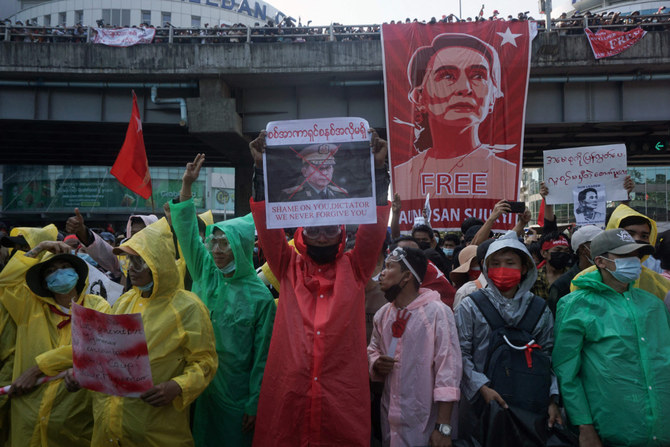Asia must call time on Myanmar’s junta

https://arab.news/5vc39
After the military coup in February, the government of Myanmar was formally run by a state administration council chaired by the leader of the military, Gen. Min Aung Hlaing. This form of executive power was provided for by the 2008 constitution for situations in which the military re-asserted formal control over the government in a national emergency.
Now the military have gone beyond the emergency provisions of the constitution, and Min Aung Hlaing has appointed himself prime minister of what the military are calling a “caretaker government,” with a — doubtful —promise of elections in two years.
This is a political move to entrench and normalise the military administration, by assuming the shape of regular government, even if the military is maintaining the state of emergency for the foreseeable future. A state administration council is by constitutional definition a temporary institution. By assuming the form of a regular government, the military administration is taking on a more permanent form, from where they can maintain the state of emergency and postpone democratic elections virtually indefinitely. To underscore this transition, Gen. Aung Hlaing even gave his address in civilian attire, a gesture meant to project both domestically and internationally that his government is a “normal” government now, not just the executive council of a military coup.
If the international community acknowledges this move, and interacts with Gen. Aung Hlaing as with a prime minister, they in effect recognize the military takeover as a fait acompli. It is therefore imperative that any diplomatic interactions with the Myanmar junta do not accord Gen. Aung Hlaing or any other representatives of his government the corresponding diplomatic status and regard.
The international community should be well aware by now that none of the promises about democratic elections and timelines will be kept. Throughout the past six months, the military leadership have attempted to maintain an outward appearance of attention to process and constitutionality, but with this latest move they have shown that this kind of posturing is as empty as their claims to be acting in the interests of the people of Myanmar, while at the same time fighting full-on battles against them. Everything that the military have done since February has been an unambiguous power play, despite the thin veil of respectability that they have lazily pretended to hide under.
Letting things be will not calm the situation in Myanmar, it will inflame it.
Azeem Ibrahim
The question now faced by the international community, and most acutely by Myanmar’s ASEAN neighbors, is whether they go along with this transparent ruse, and allow the military administration to settle in as a “normal” government with which they will engage normally — thus in effect recognising the coup; or whether they put their foot down and reject any de jure claim by Aung Hlaing to speak on behalf of Myanmar as prime minister, and head of the normal and legitimate government of the country.
The conservative instinct for most in the international community at this point will be to let things slide, lest they be drawn into confrontations for which they have no appetite. But this would be a mistake, especially for Myanmar’s neighbors. For the people of Myanmar do not, and will not for the foreseeable future, recognize the military administration as their legitimate government. Instead, they are gearing up for civil war against the military. Letting things be will not calm the situation in Myanmar, it will inflame it. And the result is that Myanmar’s neighbors in particular will have to contend with a humanitarian disaster and probably also a surge in migration into their own lands as a consequence.
If only in their own self interest, this is the time for the ASEAN countries, for China, for Bangladesh and for India to reject this move, and to start working actively against the efforts of the junta to impose themselves upon Myanmar.
• Dr. Azeem Ibrahim is a director at the Center for Global Policy and author of “The Rohingyas: Inside Myanmar’s Genocide” (Hurst, 2017). Twitter: @AzeemIbrahim







































